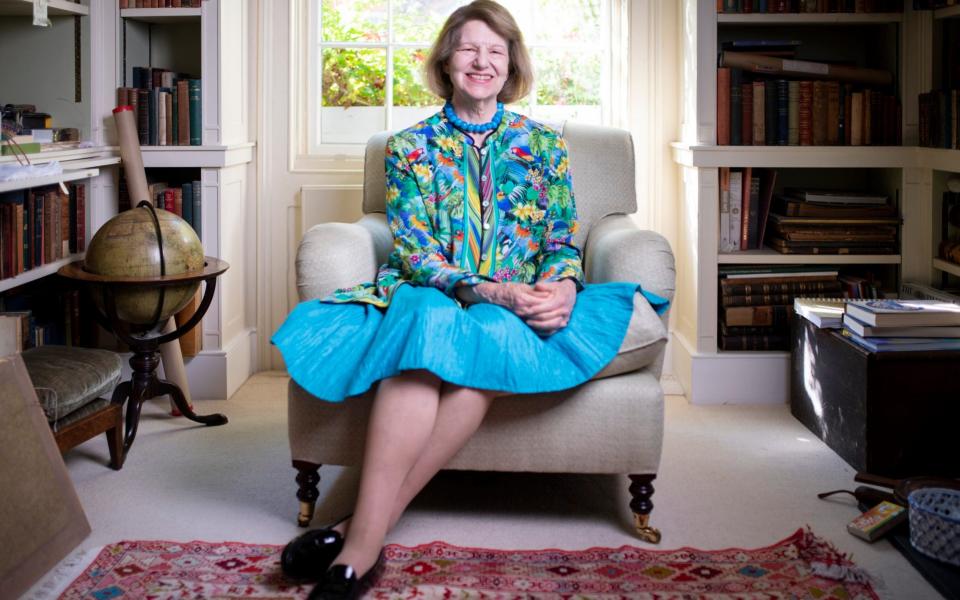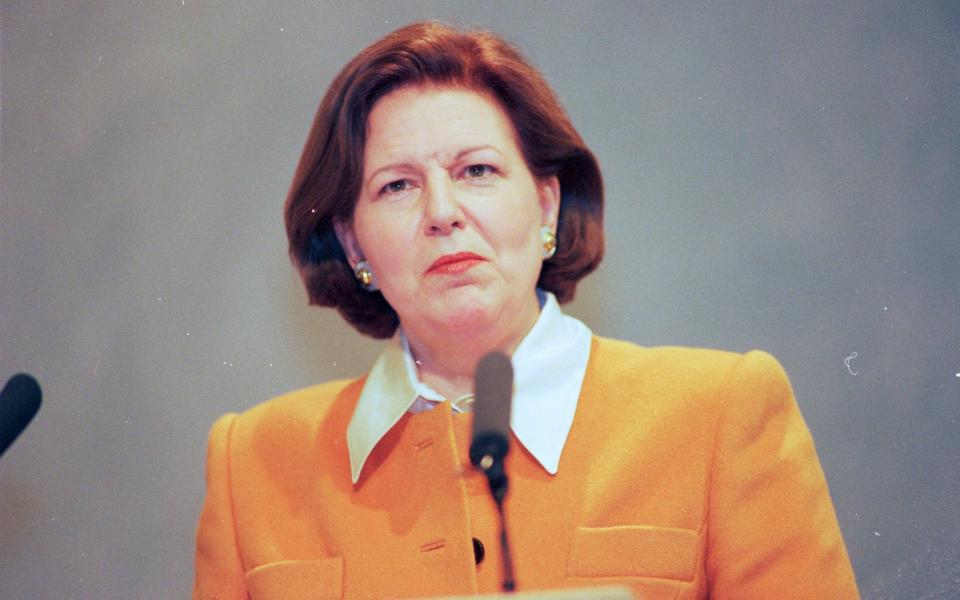'If you lose freedom of speech, that's the end'

Despite having been branded a transphobic, homophobic racist and stripped of her honorary role as vice president of the Booker Prize, Baroness Nicholson of Winterbourne insists that she would now be “delighted” to meet her accuser.
The Conservative life peer claims it would be “fun” to meet the transgender model and activist Munroe Bergdorf, who last week reported her to the House of Lords Commissioner for Standards for bullying, after an almighty row erupted between the pair on Twitter that went “viral” – and cost the Baroness her role at the literary prize that she, along with her late husband, helped inaugurate.
Issuing an “unreserved apology” to Ms Bergdorf for expressing herself “casually” on the social media site, Lady Nicholson, 78, today admits that she was “clumsy” in misgendering the catwalk star – a L’Oréal model and NSPCC ambassador who was herself forced to resign as Labour’s LBGT adviser in 2018 over homophobic and misogynistic comments.
Bergdorf’s supporters understandably took great offence to Lady Nicholson describing her as a “weird creature” in a tweet she later deleted. She still insists she intended to write “wild”, adding: “I certainly wrote much too quickly. I only ever attack causes and, in error, a person.” To say that Margaret Thatcher’s former vice chairman for women stumbled into a minefield when she attempted to give her online backing to JK Rowling, the embattled Harry Potter author, is somewhat of an understatement.
As Lady Nicholson put it during a FaceTime interview with The Sunday Telegraph from her London home: “It’s as if I’m a leper holding out a bell saying: ‘Don’t come near me – I’m toxic.’ ” The former Conservative MP for Torridge and West Devon now realises a platform that only allows for discussions in 280 characters or fewer was probably not the best forum for debating gender rights – one of the most contentious issues in a generation. “Twitter is very short, and maybe it’s not suitable for proper thinking,” she concedes. “I didn’t know anything about the lady – I’m not a L’Oréal client or a supporter of the NSPCC, because all of my charity work for children is done overseas. So I was completely unaware [of Bergdorf] and her preferred pronouns. In reply to her, I meant to write ‘M dot’, and unfortunately [autocorrect] turned it into ‘Mr’. I thought: ‘Bother…’ That’s all it was – nothing more than that.”
But within hours of the tweet, all hell broke loose. The Booker Prize Foundation, which was established 40 years ago by Lady Nicholson and her late husband, Sir Michael Harris Caine, initially distanced itself from her comments, before announcing it was cutting ties with her and three fellow vice presidents altogether. It followed pressure from writers, including Damian Barr, a bestselling gay novelist, who claimed that Lady Nicholson, who voted against same-sex marriage in the Lords in 2013, would “have the wedding ring off my finger”.
Although Lady Nicholson had previously raised concerns in both Houses about same-sex marriage and its effect on “motherhood”, she is baffled by the notion that she and the 148 members of the House of Lords who voted with her are seemingly automatically deemed to be “homophobic” seven years later. Not least when she, among the cross-party signatories to an amendment backed by Stonewall, the LGBT lobby group, allowed same-sex partnerships to be of equal value to same-sex marriage, but not identical.
Pointing out that her father, the Tory MP Sir Godfrey Nicholson, “stood out a mile because he lobbied, very heavily indeed, when it was hugely unpopular to decriminalise homosexuality”, she reveals that, as a teenager, she used to stay with Benjamin Britten, the composer, and his partner, Peter Pears, at their home in Suffolk, when she was studying at the Royal College of Music. “I stayed several times,” she says, “with Peter Pears and Benjamin Britten sharing a bedroom, when at the time it was illegal.”
In that period she had been studying piano, cello and singing, but “hit a concrete ceiling and four concrete walls” when she discovered that a bout of German measles when her mother was pregnant had destroyed 92 per cent of her hearing and badly affected her eyesight. “I knew I was never going to fill the Albert Hall,” she jokes as she lip-reads our video call. What makes the Baroness’s latest row all the more intriguing is that Lady Nicholson is far from what you’d describe as an old-school Tory blue-rinser, despite having been in politics since 1987, when she was ungallantly dubbed “the thinking man’s crumpet”.
Born into the landed gentry as the third daughter of a baronet, she none the less clashed with Thatcher over the poll tax and campaigned for un-Conservative things such as the disestablishment of the Church and the relaxation of abortion law, eventually defecting to the Liberal Democrats in 1995, before returning to the Tory fold in 2016. Lady Nicholson has also long campaigned for the minority Shia Muslims in Iraq, persecuted by Saddam Hussein, and fostered Amar Kanim, an 11-year-old orphan terribly injured by the dictator’s napalm bombing. And, on the recent debate about statues and colonial history, she insists she would rather see them “all taken down and buried”.

While she did vote against lowering the age of consent for homosexuals from 21 to 16 in 1994, she was in good company, with MPs Kenneth Clarke, Virginia Bottomley, Sebastian Coe, David Blunkett, Michael Portillo and Nigel Evans, the gay former deputy leader of the House, among those who also sided against equality. It is an opposition she has maintained throughout her life in front-line politics. “The accusation [has long been that] because I voted against same‑sex marriage, I am homophobic and transphobic and, somewhere, racist. But there’s a whole lifetime of evidence that I’m not.”
Explaining her thinking behind that seminal 2013 vote for equal marital rights, she explains: “Marriage enshrines the mother as somebody of huge importance and value. “I’ve worked in many nations where motherhood is devalued, girls are degraded and where women’s rights, in that sense, are fairly negative. My concern, at the time, was that [equal marriage] might devalue motherhood and child protection. “Basically, I’m a backbencher Anglican. I was married myself and I always followed that creed. I’ve nothing against any same-sex marriages at all. I voted the other way. It’s not an issue – I forgot about it immediately after it was done.”
In more recent times, she has written to Gavin Williamson, the Education Secretary, calling on him to “carefully consider the state’s role in telling schoolchildren that a ‘bearded man with a penis’ can be a lesbian” – as laid out in the Gender Recognition Act, drawn up under Theresa May’s government – and lobbied Matt Hancock, the Health Secretary, rallying against trans people being allowed access to single-sex NHS wards. It is correspondence that has enraged elements within the gay community.
Yet what appears to be preoccupying Lady Nicholson right now is what she describes as the “horrendous tsunami of horrific hostility to our most famous modern author”. The criticism meted out to JK Rowling, who was widely castigated earlier this month for expressing concerns about single-sex spaces and “erasing the concept of sex”, Lady Nicholson describes as “shattering”. Together, the pair helped set up the Children’s High Level Group, now Lumos, in 2010. “Someone went so far as to say [Rowling] shouldn’t be left alone with other people’s children,” says Lady Nicholson. “Well, I worked with her in the most devastating situations – you know, children tied to cots, awful things in Eastern Europe and central Europe, not just in Romania, but in other countries that are now part of the European Union, and are still doing so. So I know it’s not true. I have to say I think that’s really what spurred me on.”

Accusing Harry Potter stars Daniel Radcliffe, Emma Watson and Rupert Grint of being “shameful” in speaking out against Rowling, she declares: “For me, freedom of speech is life itself. “I am a politician. I may make mistakes with freedom of speech, but, profoundly, I believe that’s the heart of democracy. The heart of freedom is your freedom to speak, your freedom to articulate, your freedom to write and your freedom to debate. You can lose everything else, as far as I’m concerned, but if you lose that? That’s the end.”
Admitting that she found the Booker Prize’s accusation of her bigotry “extraordinary”, she reflects on what her late husband might have made of the controversy. “He would have sat back and laughed,” she jokes. In the absence of being able to talk it over with Sir Michael, who died in 1999, what she really wants now is to make amends with Ms Bergdorf. “I’ve said something that upset her, and I’m not in the business of hurting people. So hopefully we might be able to meet – which would be rather fun.”

